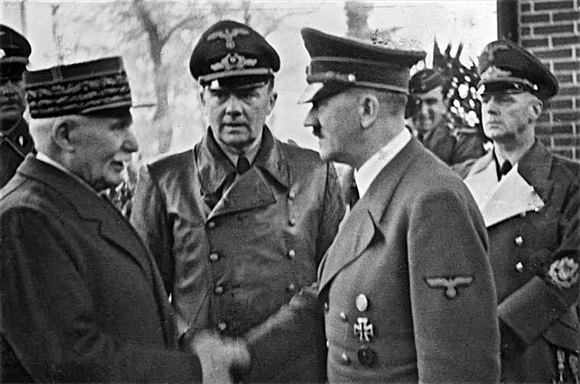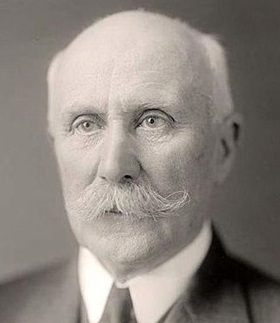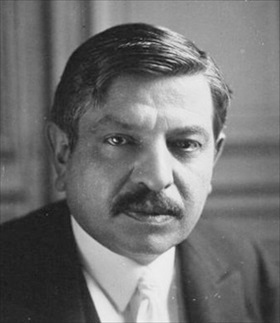HITLER, PÉTAIN MEET, PLEDGE COOPERATION
Montoire, Occupied France • October 24, 1940
After failing the day before to convince Spanish dictator Francisco Franco to bring his country into the war on the Axis side, Adolf Hitler met with 84‑year-old Maréchal (Marshal) Philippe Pétain, respected French military leader (“Victor of Verdun”) and now head of state (chef de l’État Français), and Pierre Laval, deputy leader of Vichy France, on this date, October 24, 1940. Held in the relatively isolated town of Montoire-sur-le-Loir, about 80 miles/129 km south of Paris, the secret meeting between German and French leaders had been suggested 2 days earlier by Laval. Pétain’s deputy leader was an outspoken proponent of French collaboration with Nazi Germany, even pushing his view on his boss that the Marshal formally enroll the country in the Tripartite (Axis) Pact.
Hitler’s charm offensive took place in his private railcar just outside the town’s train station. For Pétain and Laval it was important to define a new political relationship with Germany, even if it was an unequal one. On Pétain’s agenda was a reduction in the annual war indemnity France was obliged to pay the victorious Germans under the terms of the Franco-German Armistice signed 4 months earlier. Pétain also wanted Hitler to release the 1.5 million French prisoners of war who were in German POW camps, held hostage for “the duration of the war” to enforce German terms on France. (A permanent peace treaty was never negotiated.) Pétain and Laval were assured that France could expect concessions if an acceptable agreement on collaboration was negotiated.
The famous handshake between Hitler and Pétain was photographed, and Joseph Goebbels’ Nazi propaganda ministry made much use of the photo to gain support from French civilians. A week later, when Pétain publicized his meeting with Hitler, the Marshal made collaboration Vichy state policy, declaring on French radio: “I enter today on the path of collaboration” (“J’entre aujourd’hui dans la voie de la collaboration”), and inviting his countrymen to join him on the journey. Five years later, in 1945, Pétain was handed over to the provisional French government headed by his wartime nemesis, Gen. Charles de Gaulle.
Pétain’s radio address to the French nation was one of the crimes leveled against him at his postwar treason trial. In his defense, the increasingly senile 89‑year-old Pétain claimed to have done his best to protect the French people from the worst excesses of the Nazis, but he was sentenced to death along with Prime Minister Pierre Laval. Later Pétain, but not Laval, was given a reprieve by de Gaulle. In 1951 at age 95 Pétain died in his island prison, stripped of all military ranks and honors except that of Marshal of France.
Adolf Hitler and Vichy French Collaborators Philippe Pétain and Pierre Laval
 |
Above: On the October 24, 1940, Philippe Pétain and Pierre Laval conducted an historic meeting with Hitler at Montoire, France, where the 2 French leaders discussed the possible directions of Franco-German collaboration. For Pétain and Laval, military and civil collaboration (not simply accommodation) with Germany was the means by which France might secure a better place in Europe once peace had broken out or perhaps when an armistice had been arranged with Germany’s enemy, Great Britain. Collaboration would safeguard Vichy government sovereignty over the unoccupied southern (Vichy) zone and the German-occupied north and western French zones. Standing in the background (between) Pétain and Hitler is Paul-Otto Schmidt, Hitler’s chief translator and Foreign Office press chief. To the right, in the white lapels, is German Foreign Minister Joachim von Ribbentrop.
 |  |
Left: Philippe Pétain (1856–1951) was a French general who reached the distinction of Marshal (Maréchal) of France. From 1940 to 1944 he was the authoritarian Chief of State of quasi-fascist Vichy France (officially known as État Français, or French State), a sovereign territory in the unoccupied zone of France whose capital was the backwater town of Vichy. Pétain’s wartime collaboration with Nazi Germany resulted in his postwar conviction for treason (by a 1‑vote majority) and death sentence. Gen. Charles de Gaulle, who was President of the Provisional Government of the French Republic, commuted Pétain’s sentence to life imprisonment owing to the old soldier’s advance age and his military contributions in World War I. The doddering former head of state was exiled to an island prison off the French Atlantic coast, where he died at the age of 95.
![]()
Right: Pierre Laval (1883–1945) was 4‑time Prime Minister of France, twice serving the Vichy regime as head of government. An admirer of totalitarian government, Laval embraced the cause of fascism, the destruction of democracy, and the dismantling of the democratic Third Republic, whose National Assembly voted itself out of existence several weeks after the Franco-German armistice was concluded on June 22, 1941. Laval signed orders sanctioning the deportation of foreign-born Jews from French soil to the Nazi death camps. (To their everlasting dishonor, French gendarmes and police were deadly efficient in effecting this massive roundup and incarceration of Jews, which included thousands of babies and young children; not a single French policeman is recorded to have refused to obey his orders.) On September 7, 1944, what was left of the unsavory Vichy government took refuge in southwestern Germany. After falling into U.S. hands, Laval was turned over to the French government in late July 1945. Tried for high treason and violating state security, he was convicted and sentenced to death. Only 11 days after the verdict and after a failed attempt at suicide, Laval was executed, half-unconscious and vomiting, by a firing squad on October 15, 1945.
Philippe Pétain Speaking of His Historic Meeting at Montoire, Where He Entered into an Agreement to Collaborate with the German Occupiers (in French)
![]()

 History buffs, there is good news! The Daily Chronicles of World War II is now available as an ebook for $4.99 on Amazon.com. Containing a year’s worth of dated entries from this website, the ebook brings the story of this tumultuous era to life in a compelling, authoritative, and succinct manner. Featuring inventive navigation aids, the ebook enables readers to instantly move forward or backward by month and date to different dated entries. Simple and elegant! Click
History buffs, there is good news! The Daily Chronicles of World War II is now available as an ebook for $4.99 on Amazon.com. Containing a year’s worth of dated entries from this website, the ebook brings the story of this tumultuous era to life in a compelling, authoritative, and succinct manner. Featuring inventive navigation aids, the ebook enables readers to instantly move forward or backward by month and date to different dated entries. Simple and elegant! Click 











